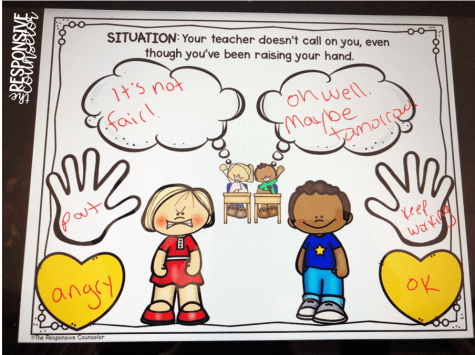Since I’m a strong believer in the power of thought, one of the lessons for 3rd grade’s problem solving unit is on positive attitude/positive thinking. Enter: Julia Cook’s Baditude! What to Do When Life Stinks! (Responsible Me!) The kiddos were all excited to see another book with the main character Noodle from our But It’s Not My Fault! lesson.

I sometimes skip a couple pages because it’s wordy, but it’s a really clear (and entertaining, especially if read in a whiny voice!) example of negative attitude. These are some of the questions I ask them while we’re reading:
- What do you think a “baditude” is?
- Pg. 18: What is a “pity party”?
- Pg. 24: What is Noodle’s mom trying to say here,
about getting back what you give? - Pg. 30: What helpful thought can
Noodle have about no video games in school? What helpful thought can he have
about sitting by a girl? - What were some of the unhelpful
thoughts Noodle had? - What were some of the helpful
thoughts his mom suggested he think instead? - I also have to stop and explain “unibrow”! Even my non-ELL students were baffled at the word before we practiced making the face!
Once we finish with the story, I task them with working in small groups (3-4) to sort 20 thought cards into “baditude” and “positive attitude.” Each year, I pick the thoughts that are most applicable to that cohort. Before I had these thought cards, I just made them on my computer. After the thought cards, I would pick the ones I wanted to use and lay them on the copy machine to make group sets of those specific ones. My students all try to be very fair about things, so their first instinct is to pass out the cards so they all have the same amount and then they read them independently and sort them. Not excellent – they don’t hear one anothers’ cards and even if they did, they’d be too distracted fiddling with their own to get anything out of it. Lesson learned? Model keeping the cards in a pile and taking turns reading and sorting them one at a time. It’s the little things sometimes!
When groups have finished sorting, they give me the thumbs up to show they’re done and I come to check it over. It’s a fairly straightforward exercise, though these two thoughts tripped some of them up:

*The letters in the corners correspond to emotions/issues that the thoughts go with. I have them all coded to its easy to pull the ones that best fit my class’, groups’, or individuals’ needs.
Then I ask them if they’ve noticed that some of the thoughts seem to be related. I give them the example of “This is too much homework.” and “Homework helps me learn.” The groups’ next job is to match all the thoughts.

Once the cards I correctly matched, I give them the go ahead to pack up their sorting cards materials. Depending on time, we end our Baditude lesson by debriefing…
- What happens when we have lots of these unhelpful thoughts? What feelings do we have? What kinds of things do we do?
- What happens when we have lots of the helpful thoughts? What feelings do we have? What kinds of things do we do?
- Which unhelpful thought do you need to stop having?
- Which helpful thought do you want to think more often?
…Or we do some more practice with these concepts, using situations fit for that class. I use the digital version of my CBT Stories to show on the Promethean boards and together as a class, we go through the characters’ thought-feeling-behavior triad. (Pictured below on my laptop since I neglected to snap any pictures in my lessons):

…Or we close out the lesson with a positive thinking themed “I Have, Who Has.” We review how it works, I pass out the cards and give them some think time with them, then I model using a loud clear voice. One trick I’ve found that helps it to go smoother: as a student is reading their card, I quickly read their “Who has” over their shoulder and begin walking around to find the student that has it so I can help if needed.
Pin for later:












One Response
This is great! I have just stumbled upon your page via Pinterest! I’m looking for things for my oldest (1st grade) he struggles with lack of empathy and negative thinking. I’m excited to review your site and use some of these activities for him! Thank you!